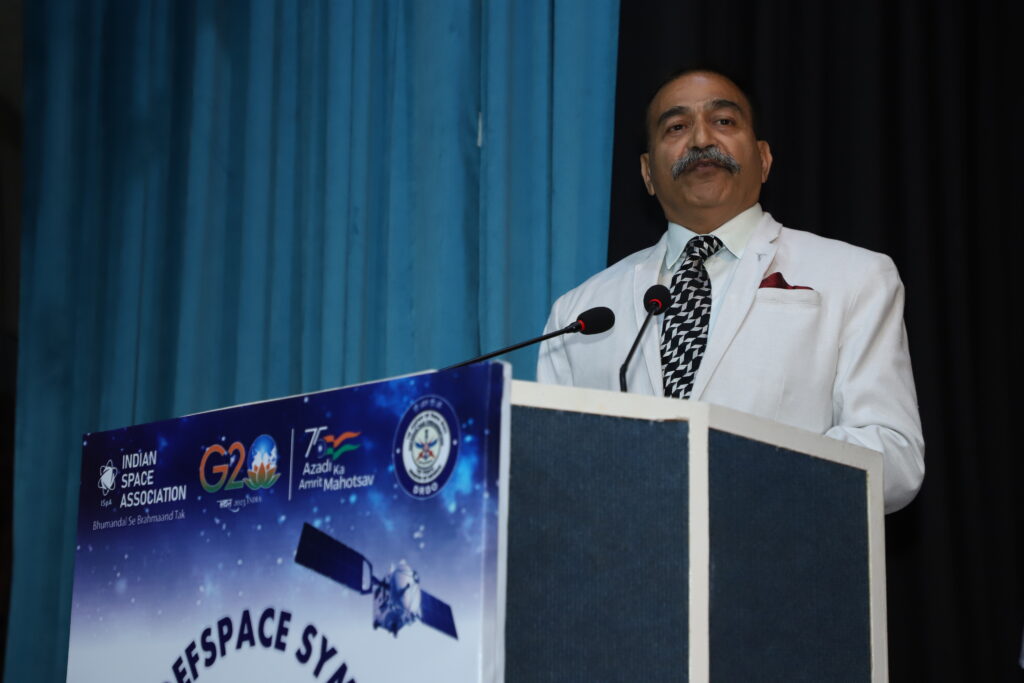By Kamal Shah
The second DefSpace Symposium promises to be a watershed in terms of underscoring India’s commitment to space exploration and harnessing its potential as a viable defence option. The get-together of the smartest minds from the armed forces, space agencies, government, and the private sector from April 18 to April 20 will provide insight, and knowledge and signpost the future of Defence and Space technologies, a trajectory that puts India in a commanding position globally.
Lt Gen AK Bhatt, Director General, Indian Space Association offers an overview of the exciting and groundbreaking schedule.
- Everyone on Earth is now getting into the space sector and exploring space. If space is a challenging area, where does India fit into the overall plan for space sustainability and security?
A: India plays a significant role in space sustainability and security as a responsible space-faring nation. With a proven capability to launch satellites and conduct outer space expeditions, India has earned credibility in the global space community.
In terms of security, India possesses capabilities in ISR, PNT (with the indigenous IRNSS-NaVIC system), and Satellite Communication. The successful ASAT test demonstrated India’s ability to defend its space assets. As national security challenges persist, India has shown a renewed focus on prioritizing space capabilities and will continue to do so in the future. India actively participates in international forums and collaborates with other nations to address space sustainability issues such as debris mitigation and the development of guidelines for responsible behaviour in space.
- AS Kiran Kumar, the former Chairman of ISRO, recently stated that for India to become the greatest economy, it is necessary to alter our position and strategy. He emphasized that the country should strive to acquire 20 percent of the space ecosystem. What is your perspective on how we might accomplish this significant achievement?
A: I agree with the former ISRO Chairman’s statement that India should strive to acquire 20% of the global space economy. While this is an ambitious target, I believe that achieving a market share of 8-10% within the next decade is a pragmatic goal (IN-SPACe Decadal Vision), with a concerted Whole of Nation approach.
To accomplish significant growth which is most desirable, the government must provide opportunities and financial incentives to Space Entrepreneurs, fostering a conducive environment for innovation and growth. We do have regulations in place with the New Space Policy and liberal FDI policy being announced by the government, what is required more is clear-cut financial incentives with Demand Generation by the government along with single window clearances through IN-SPACe which is a necessity. Also, promoting international collaborations will be crucial in expanding India’s presence in the global space market.

- The Indian space sector has propelled our nation to the forefront of global space competition, thanks to the efforts of Indian firms and entrepreneurs. How can the government help them develop the national capabilities needed to sustain the defence space industry?
A: India’s Space capabilities and enterprises have predominantly been established by ISRO. The Indian government has taken a historic step by opening up the space sector to private players in May 2020. This decision has provided immense opportunities for Indian firms and entrepreneurs to contribute to the development of national capabilities in the defence space industry. The government has already addressed the need for regulatory policies and the availability of testing facilities. However, to further support the growth of the private space ecosystem, the government should consider providing financial incentives such as Tax Holidays, Zero-GST and PLI Incentives and be as an anchor customer for the products and services developed by Indian companies. This will create a stable demand and encourage investments in research and development, ultimately strengthening India’s self-reliance in the defence space domain.

- The India Space Policy 2023 introduced substantial changes to the Foreign Direct Investment (FDI) policy in the space industry. Will this initiative facilitate the growth of Indian enterprises and startups, or will the influx of international corporations dampen their zeal to expand?
A: The introduction of substantial changes to the Foreign Direct Investment (FDI) policy for the space industry through the India Space Policy 2023 is a forward-looking and positive move. Attracting FDI is crucial for the space sector as it brings in much-needed financial investments. Moreover, FDI will facilitate cooperation, technology transfer, and the overall growth of the Indian private space ecosystem. It will also provide opportunities for Indian enterprises and startups to collaborate, learn from global best practices, and access new markets. The government should ensure a level playing field and provide support to Indian companies to enhance their competitiveness in the global arena.
- The focus of the DefSpace Symposium 2024 will be on the latest developments in DefSpace infrastructure across sectors, with an eye on meeting the needs of the combat space. In light of the current disputes, what are your thoughts on the matter?
A: Given the increasing importance of space in modern warfare, as evidenced by the recent conflict in Ukraine and in Gaza. Space has emerged as the fourth dimension of warfare, significantly impacting the fighting capabilities of land, air, and sea forces. The primary objective of the symposium is to bring together all stakeholders, including Defense Forces, Industries, Startups and Academia on a common platform to understand the aspirations and expectations of the military and explore how the industry can meet those requirements. This symposium serves as a melting pot for focused discussions on Indian defence space activities, fostering collaboration and aligning efforts toward building a robust and responsive defence space infrastructure.

- Space education in India is in its early stages and requires significant institutional and social support to reach the level of other nations. Please tell me your thoughts on the current limitations and difficulties in this area, as well as any suggestions on how to overcome them.
A: Space education in India is indeed in its early stages and to become a global player in the space domain necessitates a strong foundation in space education. This calls for significant investments and commitments from both the State and Private Space Entrepreneurs. While ISRO, IN-SPACe, and ISpA have taken initial steps, there is still a long way to go. Integrating space education into school curricula and encouraging private sector participation in establishing space education programs are crucial. The setting up of visitor galleries, such as the one at Sriharikota, is a welcome step towards increasing public awareness.

- Tier 2 and 3 cities in our nation still have a way to go before they can be considered space-savvy. How can groups like ISPA raise awareness and enthusiasm among these cities’ youth about the opportunities available to them?
A: Raising awareness and enthusiasm about space opportunities among the youth in Tier 2 and 3 cities is a priority for ISpA. We have also observed that the success of Chandrayaan-3 has already generated significant interest and excitement across the nation. ISpA members, such as SpaceKidz, OmSpace and SpaceFields, are actively involved in space education initiatives, but more organizations need to join this effort. ISpA aspires to cultivate a diverse space ecosystem by fostering the talents of students, not just in Tier 2 and 3 cities, but also among all underrepresented youth who lack access to opportunities.



